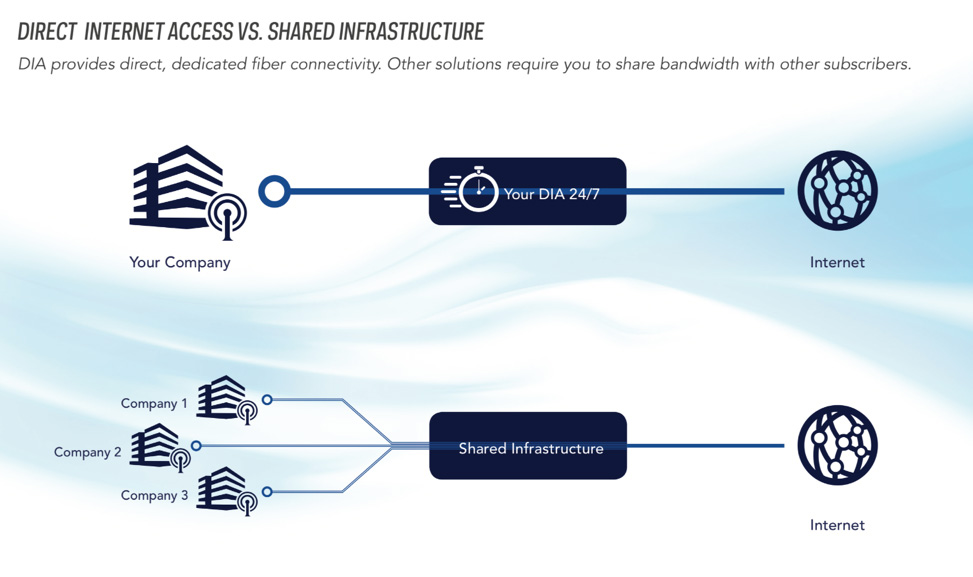
High-Speed Connectivity for Today’s Growing Businesses
For today’s companies, fast internet connectivity has moved from being a convenience to a critical component of business success. With more organizations conducting business online, moving applications and data to the cloud, and interacting with their customers, vendors, and partners, they depend on fast, reliable connectivity more than ever. To meet these needs, traditional internet access solutions like T1 lines are no longer adequate for exchanging large audio, video, and image files commonly used by manufacturing, retail, finance, healthcare, government and other organizations.
To meet their needs today and in the future, these organizations are on the hunt for internet access solutions that offer extreme reliability and faster performance. Dedicated Internet Access (DIA) gives these organizations stable, fast internet connectivity to meet the demands of modern business.
The Growing Need for Bandwidth
Whether exchanging emails, large files, collaborating over voice and video, or accessing company, customer, or partner information in the cloud, companies today find that they need more bandwidth and more uptime than ever before. But their current internet connectivity can’t keep up with the demand.
Organizations from many industry verticals experience a number of challenges with the Internet access technologies they use today.
- Slow performance – For many years, T1 lines were the gold standard of internet connectivity, delivering reliability and acceptable bandwidth. Today, the 1.544 Mbps of a T1 line is easily overwhelmed with modern voice, video and data applications.
- Unpredictable reliability – Most common Internet solutions, such as DSL from the phone company, promise higher bandwidth and fast speeds, but because that bandwidth is shared among customers and dependent upon location, the speed may not be consistent at peak times, leading to lost productivity and frustration. Microwave solutions can be affected by line-of-sight and atmospheric conditions, and experience degradation over long distances.
- Expensive equipment and maintenance – In addition to being affected by environmental conditions and natural disasters, microwave equipment and towers are expensive to purchase, deploy and maintain.
- Poor scalability – Some companies try to address bandwidth problems by bonding multiple T1s together to build the bandwidth they need with T1 reliability. However, adding T1 lines doesn’t scale well from a cost and time perspective. Instead, doubling the number of T1 lines at a business just doubles the cost.
With all the challenges of existing internet access options, companies are struggling to find an internet solution that works well. They need a solution that eases their pain today and prevents them from having to worry about how their solution will keep up in the future.
The Changing Needs of Business
With the continued growth of cloud computing, social media and collaboration tools, on top of the ever-increasing volume of digital information sent and received across the internet, companies need an internet connectivity solution that provides the reliability and speed they need for today and tomorrow, while keeping costs under control.
No matter what the industry, companies need stable, fast internet connectivity to stay current and competitive. Some industries have unique business requirements that leave them searching for better internet connectivity.
- Manufacturing – Customers now expect instant insight into their manufacturing orders, and being able to respond to customer inquiries in a timely manner relies upon reliable connectivity. Electronic communications and the exchange of large files with suppliers and contractors is crucial.
- Retail – From inventory management, to point-of- sale and timekeeping systems, to online storefronts, retail operations depend upon reliable internet connectivity in order to serve customers effectively.
- Finance – Financial organizations often have to meet regulatory requirements to keep internet connectivity to each branch. When that connectivity is down, financial transactions may not be able to be processed.
- Healthcare – Electronic medical records systems, secure patient portals, e-prescribing, and insurance and payment handling all place additional demands on bandwidth. When the internet is down, providers and staff have to resort to manual processes and paper transactions, causing a loss in productivity.
- Government – Government agencies often need to exchange large files over the internet, provide access to public records ranging from real estate records to court records, as well as communicate with state and federal agencies, and need stable, fast Internet connectivity.
- Education – From online libraries and other research sources to internet-based multimedia and video delivery of educational materials to students and faculty, schools depend upon internet connectivity.
Dedicated Internet Provides Reliability and Performance
Even with the high speeds promised by competing solutions, a fiber-optic infrastructure offers the best combination of reliability, bandwidth, scalability and cost effectiveness. Dedicated Internet Access leverages a fiber backbone to provide the fast, reliable internet connectivity today’s businesses need. Dedicated Internet Access provides:
- Reliable, dedicated bandwidth – 99.99% uptime
- Fast, scalable performance – Depending on your market, anywhere from 1 Gbps to 10 Gbps.
- Best cost per megabit – Because a fiber-optic infrastructure can supply a very large amount of bandwidth and scale easily, Dedicated Internet Access delivers cost-effective Internet access with a lower cost per megabit than competing solutions.
- Security and transparency – Internet traffic remains private and is not visible to other customers.
- Continuous performance monitoring – Typically 24/7 performance monitoring of the network with no additional maintenance or administrative burdens for IT.

With other types of internet access, companies share bandwidth with other subscribers, and they may not get the highest speed at all times, especially during peak hours. Dedicated Internet Access provides a dedicated fiber-optic connection from the business to the Internet. The physical fiber path provided by Dedicated Internet Access gives dedicated bandwidth, so that full bandwidth is always available to a business when it needs it.
![[#MSP_NAME#] Logo](/themes/sparklight_business/images/transition-logos/migration-banner-logo-[#MSP_CD#].png)
